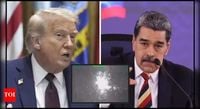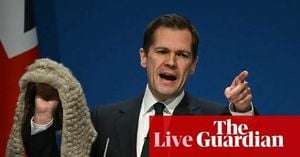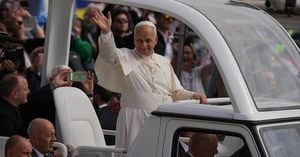On a brisk October morning in Norfolk, Virginia, the deck of the USS George H.W. Bush bustled with celebration and ceremony. President Donald Trump, flanked by First Lady Melania Trump, addressed a sea of uniformed sailors to mark the 250th anniversary of the U.S. Navy. But beneath the patriotic pageantry, the president’s words carried a message that reverberated far beyond the hull of the aircraft carrier: the United States was at war—this time, not with a nation, but with international drug cartels.
"Every one of those boats is responsible for the death of 25,000 American people and the destruction of families. So when you think of it that way, what we're doing is actually an act of kindness. But we did another one last night. Now we just can't find any," President Trump declared, referencing a fresh military strike against an alleged cartel drug boat off the coast of Venezuela the previous evening, as reported by ABC News.
The president’s remarks were not mere rhetoric. Over the preceding weeks, the U.S. military had launched at least four strikes on suspected smuggling vessels in the Caribbean Sea, actions that, according to the Pentagon and The Hill, had resulted in the deaths of 21 people identified by U.S. officials as "narco-terrorists." Defense Secretary Pete Hegseth confirmed that the most recent strike, carried out on Friday, October 3, targeted a vessel affiliated with a designated terrorist organization in the U.S. Southern Command's area of responsibility. Notably, no U.S. personnel were injured during these missions, which took place in international waters.
Trump’s campaign against the cartels was more than a military maneuver—it was a declaration of a new kind of conflict. On October 2, 2025, he formally declared the U.S. to be at war with drug cartels, labeling them "unlawful combatants" and designating several, including the powerful Tren de Aragua cartel based in Venezuela, as global terrorist organizations. In a letter to Congress, the administration asserted that America was engaged in a "non-international armed conflict" with these groups, a move that, according to Al Jazeera, provided the legal rationale for the strikes.
But the legal and ethical foundations of this new war have been hotly contested. Human Rights Watch and numerous legal experts have criticized the strikes as "extrajudicial killings" and violations of international law. Sarah Yager, Washington director at Human Rights Watch, argued, "U.S. officials cannot summarily kill people they accuse of smuggling drugs. The problem of narcotics entering the United States is not an armed conflict, and U.S. officials cannot circumvent their human rights obligations by pretending otherwise."
Salvador Santino Regilme, a political scientist at Leiden University, told Al Jazeera that under Article 2(4) of the United Nations Charter, the use of force by one state against another is prohibited unless authorized by the UN Security Council or exercised in legitimate self-defense. He added that drug trafficking, even when transnational, does not qualify as an "armed attack" under customary international law. "Unless Washington can prove that the targeted actors carried out or imminently threatened a large-scale armed attack attributable to Venezuela, these actions risk violating the charter’s core prohibition on the use of force and undermining another state’s territorial integrity," Regilme explained.
Meanwhile, the domestic legal justification for these operations has come under scrutiny. The U.S. Justice Department’s Office of Legal Counsel reportedly issued an opinion granting the president broad authority to use deadly force against cartels deemed an imminent threat to Americans. Legal analysts, such as Sarah Harrison, a former associate general counsel at the Defense Department, warned that "if the OLC opinion authorizing strikes on cartels is as broad as it seems, it would mean DOJ has interpreted the President to have such extraordinary powers that he alone can decide to prosecute a war far broader than what Congress authorized after the attacks on 9/11."
In Congress, the response was swift and divided. Democratic Senators Adam Schiff and Tim Kaine introduced a resolution under the War Powers Act to prevent further U.S. military strikes against vessels near Venezuela. "Congress alone holds the power to declare war. And while we share with the executive branch the imperative of preventing and deterring drugs from reaching our shores, blowing up boats without any legal justification risks dragging the United States into another war and provoking unjustified hostilities against our own citizens," Schiff said, as reported by The Hill. Yet, with both chambers under GOP control, the resolution faces a steep uphill battle.
Venezuela, for its part, has condemned the U.S. strikes as "heinous crimes." President Nicolás Maduro warned of a possible state of emergency and accused Washington of seeking regime change under the guise of anti-narcotics operations. The Venezuelan government staged military drills, mobilized militias, and deployed Russian-made fighter jets as part of a nationwide "defense of the nation" campaign. According to venezuelanalysis.com, Caracas also accused the U.S. of staging "false flag operations" to justify military escalation, and denounced recent incursions by U.S. fighter jets as "maneuvers threatening Venezuelan sovereignty."
Despite the Trump administration’s claims that Venezuela plays a central role in the drug trade, both the U.S. Drug Enforcement Agency and the United Nations Office on Drugs and Crime have found that Venezuela is not a drug-producing country and plays only a marginal role in international narcotics trafficking. Nevertheless, the White House has levied "narcoterrorism" accusations against high-ranking Venezuelan officials, even placing a $50 million bounty on Maduro.
The military build-up in the Caribbean is substantial. Reports from Reuters and other outlets confirm the deployment of at least eight U.S. warships, one submarine, and F-35 aircraft to Puerto Rico, bringing thousands of sailors and marines to the region. As President Trump boasted to sailors at Naval Station Norfolk, "Every tyrant and adversary on the planet knows their choice is very simple: it's leave America in peace, or be blown up in fire and fury never seen before." He added, "We win. Now, we win. We don't want to be politically correct anymore."
In the president’s view, these actions are not just about military might but about protecting American families. "Maybe some of you will be angry. You'll say, 'What's he doing? We want to fight.' You know what, if we can solve them the way I'm solving them, we solved seven. We have another one that's taken 3,000 years, and we're pretty close," Trump said, hinting at ongoing negotiations to end the war in Gaza and his desire to resolve conflicts without prolonged combat.
As the U.S. Navy continues its high-seas campaign and the legal, political, and diplomatic fallout intensifies, the world is watching closely. The stakes are high, not only for the future of U.S.-Venezuela relations but for the evolving norms of international law and the boundaries of presidential power. For now, the Caribbean remains tense, its waters patrolled by warships and shadowed by uncertainty.





